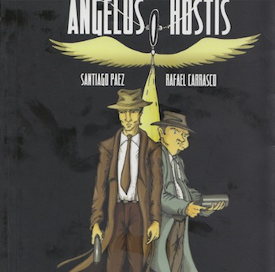
As I promised last week, tomorrow is the first day that Canadians (which includes both Canadian citizens throughout the world and people resident in Canada) will be able to vote for the Aurora Award, Canada’s equivalent to the Hugos. If you fit into one of those categories, you can join CSFFA (the Canadian SF & Fantasy Association, sponsor of the Auroras) and vote; or, if you’re already a member, you can now vote for your choice of winner in a number of categories.
(It costs $10 Canadian to join CSFFA; information on joining is here.) When you’ve downloaded the voters’ package, which contains most of the nominated works—including a link to my 45 columns from 2016—and read everything (sounds like a daunting task, but the works themselves make reading a pleasant chore), you can then go to this link and vote (at this time the ballot hasn’t been opened for voting, so I can’t provide a direct link). If you find my column worthy, I’d appreciate your vote; 2017 marks the third year in a row I’ve been nominated (and thanks to all those who nominated me!); I’d love to actually win!

Before I get into the subject of today’s column, I’d like to give you a couple of words about how I select stuff to review. Although this column is so far unpaid in actual cash, the side benefit is that, as a reader, I’m inundated with SF and fantasy to read for free! And as anyone who spends a fair amount of time on the computer can tell you, IRL has certain demands too. So I don’t review everything sent to me, between the demands of reading and Real Life; something’s gotta give, so I do review multimedia more often than written material because it only takes a couple of hours to watch a movie.
Okay, let’s open up the July-August 2017 Magazine of Fantasy and Science Fiction. The longest story is the cover story, “There Was a Crooked Man, He Flipped a Crooked House” by David Erik Nelson, who apparently lived in a house in Detroit as a child that looked a lot like the cover by Nicholas Grunas, though I sincerely doubt it had any of the qualities of the house in the story.
The protagonist of the story is Glenn Washington who, along with his large, mentally challenged partner Lennie (shades of Steinbeck!) Epstein, works for a property flipper nicknamed “The Butcher” Fleischermann in Detroit. Now, as most people know, Detroit has gone through some hard times, and a lot of properties were just abandoned. Fleischermann buys these for pennies on the dollar and Glenn and Lennie are tasked with determining if the property is a tear-down or a fixer-upper; the best ones are bought for $5K and sold for $30K.
But when they hit the property shown on the cover, it didn’t look abandoned at all (Fleischermann had bought it sight-unseen). Peering through the small diamond panes in the door, he could see it looked fully furnished! The keys had apparently been lost, but Glenn has his locksmith license—necessary in Detroit if you’re a black man on legitimate business carrying lockpicks. As Glenn’s about to pick the lock he and Lennie are hassled by two Detroit cops; after the cops leave, Glenn gets the door open and steps inside.
Only to find himself stepping out the back screen door into the back yard. After a few tries, Glenn discovers that if you go in the front door you end up in the back yard; if you go in through the back door you end up on the roof, and so on. The house is like something built by Möbius! And from there, the story gets weird. It’s very well written, kind of like a combination of Henry Kuttner and Howard Phillips Lovecraft in some ways. There are no “eldritch horrors”—and nothing “squamous,” either—but it’s got as creepy an ethos as anything HPL ever wrote, with a good dash of self-deprecating humour thrown in. I really liked it!
The second-largest story also features black protagonists, but in a much different manner; first, it’s kind of a historical piece, telling about the life of a plantation slave in the antebellum South. Justin C. Key’s “Afiya’s Song” is set in 1821 South Carolina, but in a slightly alternate past.
Narrated mostly in a semi-patois by a former slave, it tells of Afiya, who endured most of what we believe a female black woman would have in that time and place; we are treated in some detail to Afiya’s life, which differed from the usual slave life in a couple of major ways: one being her ability to sing her ancestors’ songs, songs of power, and of healing. The other being her centrality the part of that history—I can’t say too much without giving too much away about the story—which differs from our own. Also well written and worth the read.
Moving down in size, we come to “An Obstruction to Delivery” by Sean Adams, which tells of an odd Postal Service in an unnamed town. Because I have been a stamp collector for many years, I had a hard time with this one. Not that it wasn’t written well, but because the Postal Service in the United States is not a municipal service, as it is in this story. It’s Federally administered, as I believe it is (where it hasn’t been privatized) in most countries. That being said, you might not have as much difficulty with this as I did.
In the story, the unnamed city is responsible for the postal service, and since a network of tunnels underneath the city had been found during the construction of an underground parking garage, the Mayor had decided—for reasons detailed in the story—to move all postal routes underground. Which saved the city a large amount of cash, but when something started reducing postal workers to piles of bones, there was a certain amount of consternation in the postal service. There’s a dry humour to the story. As I said, I couldn’t really get beyond the basic premise, but the story was well enough written for all that.
G. V. Anderson’s “I Am Not I” gives the impression at first read that it’s some kind of fantasy, perhaps in the vein of Matthew Hughes’s “Raffalon” stories, but once you get into it, you realize that it’s the purest kind of science fiction. The protagonist/narrator’s surname is Strohm-Waxxog, and she’s working for an “acristologer” named Madame Qlym, who has eight arms. It quickly becomes clear to the reader that this is indeed Earth (or an Earth) in the future, where body/gene mods become so common that fewer and fewer true humans (called “Saps”) are born, and are looked down on by the Varians—those who are more insectile than human. A chilling little discourse that assures us that no matter how people’s bodies change, their minds remain the same. Well done!
”The Masochist’s Assistant” by Auston Habershaw is indeed fantasy, and very similar in some ways to the Hughes fantasies mentioned before, at least in that our protagonist is bound by societal rules and protocols quite different and stricter than any we are accustomed to. It begins “Each morning at precisely seven, Georges, famulus to Magus Hugarth Madswom, stabbed his master in the heart.” How’s that for a beginning? Turns out that Magus Madswom, is trying to build up his immunity to being stabbed in the heart (only one of the odd behaviours that are trying Georges’s patience and his social standing with the rest of his community). Georges had thought becoming a famulus would be his key to a higher social standing, but found out to his dismay that Magus Madswom had absolutely no regard for social standing or, indeed, for society in general. Amusingly written, and the ending is fitting.
And now, for a change of pace, we go to one of the shorter works: “A Dog’s Story,” by Gardner Dozois. Blackie is a dog (type unknown), who lives with (and belongs to) “Good Boy C’mere”; Blackie’s getting old, but on occasion likes to sneak out when the Moon is full and roam around the town while Good Boy C’mere is snoozing in front of the Noisy Box. One moonlit night, Blackie finds the body of a slain human—a young woman—that reminds him of a human he belonged to when he was just a puppy. Blackie finds his own way of dealing with a killer. Great story, and glad Gardner took some time away from editing and anthologizing to write it!
Robin Furth makes her F&SF debut with “The Bride in Sea-Green Velvet,” and a rich little tapestry it is. It’s a fantasy set on Earth, time unknown, but apparently eighteenth or nineteenth century. Sir Henry is the Lord of the Manor, and his forty-ninth birthday (“Seven times seven”) is fast approaching.
There is a sacrifice to be made, and aided by DeMains, who is something of a forensic reconstructor, Sir Henry is ready to make it. I fear to say more about the story, as I might give too much away. Although the ending was somewhat predictable—maybe only to someone who has read enough old fantasy—the story itself was interestingly and well written.
”In a Wide Sky, Hidden” by William Ledbetter, is another pure SF story, also set in a much future Earth. Here we are not concerned with body modification as much as we are with exploration and/or art. With the recent news that Chinese scientists have used quantum entanglement to transmit information from the Gobi desert to orbit, that particular scientific discovery is very much on people’s minds.
In this story, quantum entanglement is used to store and transmit people—as information—far quicker than physical bodies can travel, with the added side benefit that a healthy template is always storable in case of aging, disease or injury. The protagonist is searching space for a sister he hasn’t seen in many years, with surprising results, at least for the protagonist.
The remaining pieces, “An Unearned Death” by Marissa Lingen and the poem “Northwest Cruise” by Sophie M. White are both worth reading; as always, I like to leave a little unreviewed as an exercise for the reader. Overall, I liked this issue; I remain a staunch F&SF fan!
Please comment on this column if you have any comment at all. You can comment on my Facebook page, or in the several Facebook groups where I publish a link to this column, or you can sign in here and comment. All comments are welcome. And don’t feel you have to agree with me to comment; my opinion is, as always, my own, and doesn’t necessarily reflect the views of Amazing Stories or its owners, editors, publishers or other columnists. See you next week!










